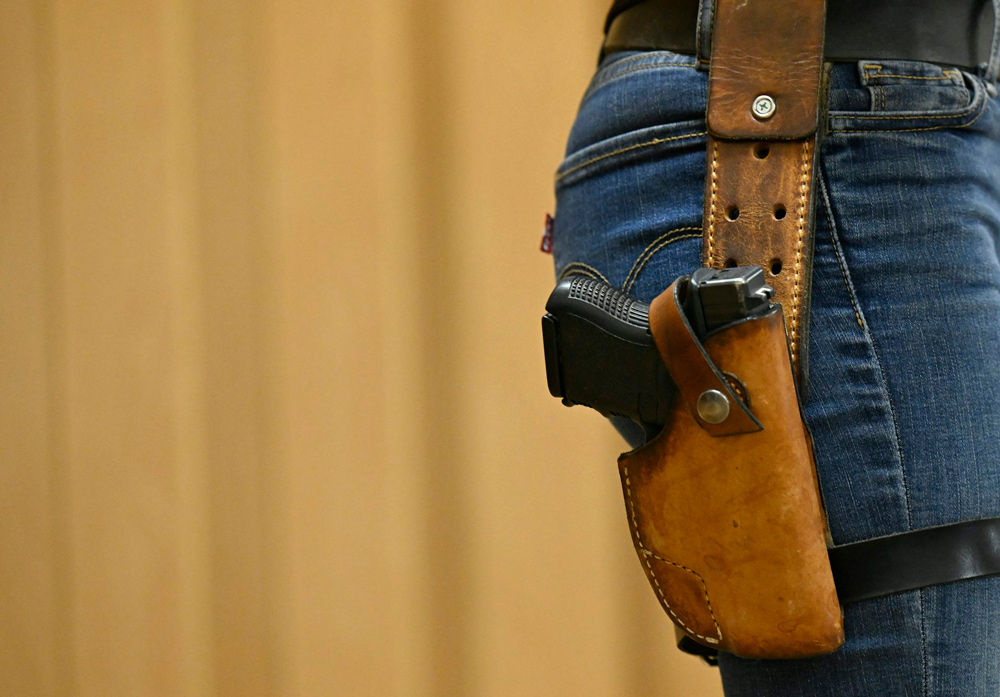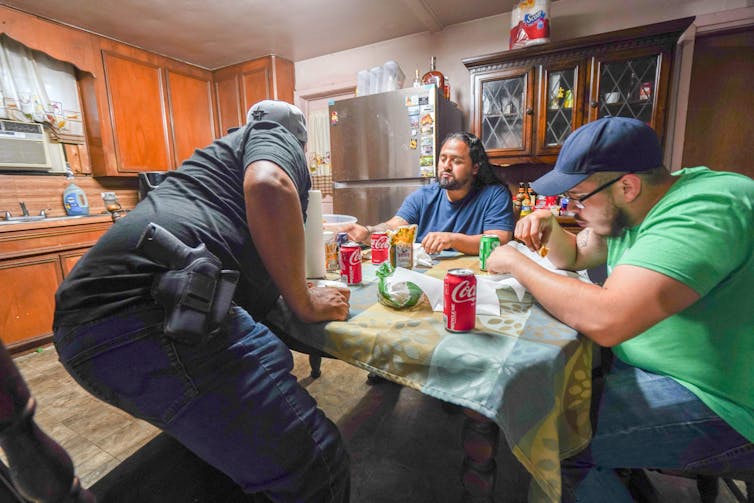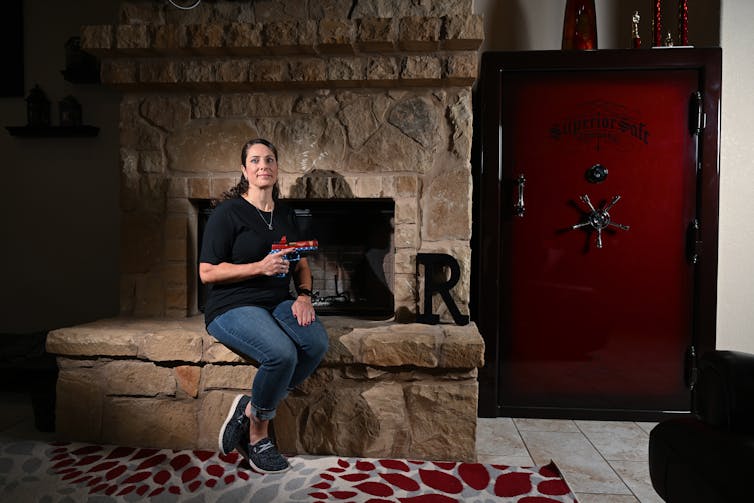
By Nick Buttrick
Kamala Harris, Donald Trump, Tim Walz and JD Vance all have something in common. All four of them, along with an estimated 42% of American adults, have lived in a home with at least one gun.
Gun ownership in the United States is widespread and cuts across all sorts of cultural divides – including race, class and political ideology. Like all mass experiences in American life, owning a gun can mean very different things to different people.
One thing that American gun owners tend to agree on, no matter their differences, is that guns are for personal protection. In a 2023 Pew survey, 72% of gun owners reported that they owned a firearm at least in part for protection, and 81% of gun owners reported that owning a gun helped them to feel safer. This perspective contrasts to that of gun owners in other developed economies, who generally report that guns are more dangerous than safe and that they own a gun for some other reason.
I’m a psychologist who studies contemporary society. In the lab, my colleagues and I have been investigating this feeling of safety that American gun owners report. We’re trying to get a more complete sense of just what people are using their firearms to protect against. Our research suggests it goes much deeper than physical threats.

Cécile Clocheret/AFP via Getty Images
Protection goes beyond the physical
By combining social-scientific research on firearms ownership with a raft of interviews we’ve conducted, we’ve developed a theory that gun owners aren’t just protecting against the specific threat of physical violence. Owners are also using a gun to protect their psychological selves. Owning a gun helps them feel more in control of the world around them and more able to live meaningful, purposeful lives that connect to the people and communities they care for.
This sort of protection may be especially appealing to those who think that the normal institutions of society – such as the police or the government – are either unable or unwilling to keep them safe. They feel they need to take protection into their own hands.
This use of a deadly weapon to provide comfort and solace may come at a cost, however, as firearms often bring a heightened sense of vigilance with them. Firearm instructors frequently teach owners to be especially aware of their environment and all the potential dangers and threats within. When gun owners look for danger, they often are more likely to find it.
Gun owners may end up perceiving the world as a more dangerous place, institutions as more uncaring or incompetent, and their own private actions as all the more important for securing their lives and their livelihoods.
How gun owners feel during daily life
What does this cycle of protection and threat look like in everyday life? My colleagues and I recently ran a study to investigate. We’re still undergoing peer review, so our work is not final yet.
We recruited a group of over 150 firearms owners who told us that they regularly carry their guns, along with over 100 demographically matched Americans who have never owned a gun. Over two weeks, our research team texted the participants at two random times each day, asking them to fill out a survey telling us what they were doing and how they were feeling.
To get a sense of how guns change the psychological landscape of their owners, we divided our gun-carrying group into two. When we texted one half of the group, before we asked any other questions, we simply asked whether they had their gun accessible and why they’d made that decision. For the other half of our gun-owning participants, and for our non-gun-owning control group, firearms and firearm carrying never came up.
When subtly reminded of guns in general – regardless of whether their gun was accessible – our participants reported feeling more safe and in control and that their lives were more meaningful. Thanks to our random-assignment procedure, we can be pretty confident that it was thinking about guns, as opposed to any differences in the underlying groups themselves, that caused this particular increase in psychological well-being.
About half of the times that we texted, the gun owners told us that they had a gun accessible at that moment. When a gun was handy, our participants told us that they were feeling more vigilant and anxious, and that their immediate situation was more chaotic. This result didn’t seem to be driven by owners choosing to have guns available when they were putting themselves into objectively more dangerous situations: We found the same pattern when we looked just at moments when our participants were sitting at home, watching television.
Raising fear and promising rescue
Contemporary American gun ownership may have conflicting messages embedded within it. First, a gun is a thing you can use to bolster your fundamental psychological needs to feel safe, to feel in control and to feel like you matter and belong. Second, having a gun focuses your attention on the dangers of the world.
By both fueling a sense of danger and holding out the promise of rescuing you from the fear, messaging around guns may end up locking some owners into a sort of doom loop.

Matt McClain/The Washington Post via Getty Images
My collaborators and I are currently exploring whether stressing other parts of gun ownership may help owners to move beyond this negative spiral. For instance, while owners often talk about “danger,” they also talk frequently about “responsibility.”
Being a responsible gun owner is central to many owners’ identities. In one study, 97% of owners reported that they were “more responsible than the average gun owner,” and 23% rated themselves as being in the top 1% of responsibility overall. This, of course, is statistically impossible.
To more fully understand the many ways responsible firearm ownership can look, we are in the process of interviewing gun owners from all around the state of Wisconsin, a notably diverse state when it comes to gun ownership. We’re tapping into as many of the ways of owning a gun as we can, talking with protective owners, hunters, sport shooters, collectors, folks in urban areas, folks in rural areas, men, women, young people, old people, liberals, conservatives, and, of course, trying to capture the complex ways that race shapes ownership.
Who do gun owners feel they are responsible for? What kinds of actions do they think responsible owners take?
We hope to learn more about the many different ways that people conceptualize what a gun can do for them. American gun cultures are complex and distinct things. By exploring the worldviews that support firearm ownership, we can better understand what it means to live in the U.S. today.
![]()
Nick Buttrick is Assistant Professor of Psychology at the University of Wisconsin-Madison.





























Pogo says
@Nick Buttrick
Please sir, more.
Thank you.
https://psych.wisc.edu/news/latimes-why-former-slave-states-became-the-foundation-for-american-gun-culture/
JimboXYZ says
With the Fentanyl abuse, who wants to be that victim of the criminals that can move in down the street or worse, next door. It isn’t the routine of never needing to have or use a firearm, it’s the one time that you did. Maybe, having one & the one that carries is unprepared to actually defend themselves. For example, a lot of good it did Trump to have a gun in PA earlier this year. Hunter Biden committed felonies on a Federal form to get his. Sometimes the gun criminalizes someone that might not have a problem in life without a gun. Self defense might only be a courtroom defense, convincing a jury is the part where SYG (Stand Your Ground) can be a challenge. Sometimes the judge makes the call on whether SYG can actually be used as a defense. SYG isn’t as simple as some people think it is. Too many people have an opinion that may not be as the victim sees it ? And certainly social agendas might even influence who is allowed or not to use a SYG defense. Anyone trust the State AG as prosecution enough to bet the rest of their life that the State also sees it their way ? I’d rather not test that, but sometimes another forces the issue and then it’s a tough call to make in the moment. Who knows what anyone else may be carrying just the same, the stakes are that high.
https://www.huffpost.com/entry/marissa-alexander-florida-stand-your-ground_n_1472647
JW says
The American character has a persistent undercurrent of INSECURITY and DEPRESSION. It is a mental condition that drives the country’s psychiatry and psychology. We continue to score lower and lower on the “happiness scale” than other developed nations. Most Americans feel inadequate to meet life’s challenges, since they are not rich, powerful, glamorous or influential.
Major contributing factors are: lack of adequate parenting (no time and knowledge), low quality of schools (compared to other countries) and obsession with sports and entertainment.
You just wonder why we consider ourselves the greatest nation on earth. Well, we are a “feel good society” without realizing the narcissism embedded it that.
As we can see with our mighty military industrial complex, weapons of any sort never did any good other than showing the insecurity of Americans.
jake says
“As we can see with our mighty military industrial complex, weapons of any sort never did any good other than showing the insecurity of Americans.”
Yet, America keeps showing up to help resolve world disorder, such as WWII.
The United States Must Be the World’s Policeman
https://rasmussenglobal.com/the-united-states-must-be-the-worlds-policeman/
Pierre Tristam says
What do you mean, keeps showing up to resolve world disorder? In the last 80 years, since the incinerating ashes of Hiroshima and Nagasaki, where has the United States resolved a single problem? It’s shown up all right but only–to quote Tacitus quoting some obscure guy–to make deserts and call it peace.
Florida Voter says
Pierre, you asked where the US (military) has resolved a single problem.
Let’s make a list: Taiwan … still in a “revolutionary war,” Korea .… actually still at war, Vietnam … definitely not, Cuba … no, Cambodia … no, any African country … no, same for any Central American country, Israel … just take a look, Iran or Iraq … very no, Afghanistan … big time NOPE, a few other countries … not likely, leaving:
West Berlin (June 26, 1948 to September 30, 1949) success
Kuwait (1990-1991) (although definitely not Iraq) success
Kosovo (1999 – current) success, and maybe some other countries in that area.
… those are the only three actual American military successes that I can think of.
Most military actions keep the conflict off American soil, outsourcing the death and destruction (good for America, bad for most everyone else).
Pierre Tristam says
Good summation, thank you. The Berlin airlift, while not quite a military engagement in the traditional sense, really was one of the great achievements of the military–any military–in history, and lifts one’s heart just thinking about it. I can see those candies raining on the kids, and the gifts parachuting at Christmas. I might quibble with Kuwait, in that saving that playboy oligarchy turned out to be a set-up for the eventual disaster that was the Iraq War.
Denali says
As a 60 year plus gun owner (rifles, shotguns and handguns) I have never had the desire nor found a reason to wear a sidearm in public. And quite honestly do not understand the current culture. Then again, before moving to Palm Coast the majority of my life has been spent in areas where we do not lock our doors, keys are left in the car and most every pickup has a gun rack in the rear window which is only loaded during hunting seasons.
Actually I am of the opinion that the vast majority of people carrying a handgun in public need to file off the front sight. That way when it is taken away from you and inserted where the “sun don’t shine”, it does not hurt as bad.
Mondexian Mama says
About 80% of police officers go their entire career without ever unholstering their weapons. Why the average untrained citizen thinks they need to arm themselves to the teeth to go about in public is a sickness that needs to be addressed. When the Second Amendment was written musket loading guns were the state of the art; it took almost a minute to reload one and they were not that accurate in hitting a target. I seriously doubt the framers of our Constitution would have been supportive of a weapon that can fire up to 50 rounds per minute, no less have an untrained population sporting them in public. I am a multiple gun owner and I’m totally in favor or our Second Amendment rights, but I also favor oversight on gun ownership. Before we can get a license to drive, we are required to pass a written as well as a driving test and I feel the same standards should be applied for a concealed weapon. There are too, too many gun toters who have little to no experience in the proper handling of firearms.
Joe D says
Interesting article…the PERCEPTION of personal fear seems more important than the actual danger. I fully agree with that.
I grew up in a house with rifles and shotguns. My father hunted (pheasants and Squirrels…not deer…he said they were “too beautiful an animal”). He had his license, the guns were registered. When we were mid teens, he took my brother and I several times to a club shooting range to show us how to shoot, and show gun safety. My younger brother even got his Boy Scout Merit Badge in gun safety (sponsored by the NRA). However there were no
Handguns, and I don’t think ASSAULT rifles were even around then (1960’s-early 1970’s). The guns were kept in a locked cabinet…but we knew where the key was. He would have KILLED us (almost literally), if we had touched those guns without his permission…and we didn’t.
Fast forward; I never had guns in my former home state (Maryland). I didn’t hunt, and I had kids, and I just didn’t want to take the chance….Maryland has strict gun carry laws, and registration, and a high capacity (over 10 rounds) gun ban, with assault weapons ban. You have to have a license to carry (concealed or open), you have to pass a background check, and you have to have minimal (documented) training, and there was a limit on how many guns you could purchase each month. I never felt the need to have a gun ( I did carry pepper spray and a pocket knife).
NOW I’m retiring to Florida…OMG! No license/no mandatory training/ no serious background checks…just “essentially” put down your money and walk away with your weapon…
I’m now considering getting a hand gun for self (and home) protection. What changed? My PERCEPTION of personal safety. I’m now assuming a large percentage of the people I’m out in public with ( the men at least…although that’s not true anymore, ladies), have a gun on them.
I’m MORE concerned that some untrained (or minimally trained) numskull will either shoot me by accident, or I’ll come across someone under the influence ( alcohol or drugs), who has no IMPULSE control, and will pull a gun on me for looking at them the wrong way! Since there are few checks and limits… almost anyone can LEGALLY (forget the ghost guns and stolen guns), in the FREE State of Florida, own a gun!
My final comment, is WHO NEEDS an automatic or semiautomatic assault weapon for self protection!?! REALLY? A 10 round automatic hand gun isn’t enough?
So YES, I will probably soon (unfortunately), buy a hand gun, due to my new PERCEPTION of lack of personal safety in this State where I’m starting to assume EVERYONE could be carrying a gun….how SAD (and DANGEROUS)!
Sherry says
Fox fear and hate mongering . . Full Stop!